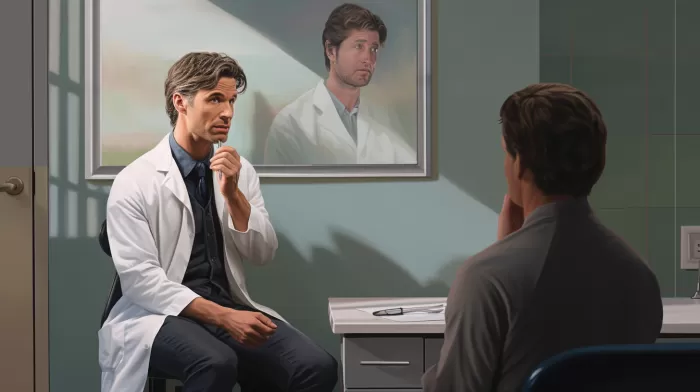Sex is supposed to feel good, so it can be particularly worrisome when it doesn’t. Dyspareunia is the term for painful sexual intercourse that is due to medical or psychological causes. Sexual pain can involve pain in the penis, testis or pelvis area during or after sex. If you’re a man experiencing this uncomfortable issue, here are five possible causes of your sexual pain.
Physical abnormalities
Physical abnormalities, such as Peyronie’s disease, a tight foreskin, scarring or frenulum breve, can cause sexual pain. Frenulum breve is when the frenulum, the elastic band of tissue under the glans (head of the penis) that attaches to the foreskin, is short and slender. According to one study, frenulum breve accounted for 50 percent of men who had dyspareunia. Treatment may require surgery.
Peyronie’s disease is a condition when the penis bends or curves, usually when erect. It can be due to inflammation or abnormal scar tissue. See your doctor for a complete examination to rule out physical problems that could be causing your sexual pain.
Prostatitis—chronic pelvic pain
Chronic prostatitis, also known as chronic pelvic pain syndrome, can cause sexual pain for men. This condition affects about 50 percent of men at some point in their lives. Prostatitis can lead to pain during sex, during ejaculation, or pain after sex. Some men suffer from chronic pelvic pain or testicular pain.
There are several things you can do to reduce pain during sex when you have prostatitis. There are many tools, exercises, alternative treatments and supplements that can help. Urologists recommend phytotherapy, a natural therapy that involves combining the supplements pollen extracts and quercetin, to help manage sexual pain and pelvic floor spasm. Many times sexual pain with prostatitis is due to a weakness, spasm, or other dysfunction of the pelvic floor muscles. A pelvic floor specialist can help you find the right treatment and exercises to help rehabilitate these muscles.
Infections
Infections in the prostate, bladder or seminal vesicles can cause intense burning or itching after ejaculations. Both acute and chronic bacterial prostatitis symptoms can include painful ejaculation and pain in the penis or testicles. Sexually transmitted diseases can also cause sexual pain in men. For example, gonorrheal infections can sometimes cause burning or sharp penile pains during ejaculation. If you have a sexually transmitted disease, make sure your partner gets treated, too.
You will need to see your doctor to rule out an infection, and if you do have an infection, it is usually treatable with antibiotics. If you take antibiotics, be sure to take a quality probiotic to help restore your balance of beneficial bacteria in the gut.
Interstitial cystitis
Interstitial cystitis (IC) is a chronic inflammatory bladder condition that is a similar condition to prostatitis. Men with IC may have pain during sexual intercourse, in the pelvis, or in the perineal area between the scrotum and anus. Like chronic prostatitis, IC is difficult to treat, but men may find relief from bladder training, physical therapy, making lifestyle changes, exercise, avoiding bladder irritants (like spicy foods and caffeine), alternative treatments (like acupuncture) and medication.
Psychological causes
Once your doctor has ruled out any physical abnormalities, you should consider whether the pain is based on psychological or emotional problems. Sexual pain disorders have been linked to anxiety, and may occur as a result of having anxiety related to sex or intimacy. If you have been the victim of sexual assault or abuse, it can manifest in sexual pain or anxiety. Men who are depressed may also experience sexual pain.
It is important not to suffer alone. Open up to your partner about your sexual pain and find a medical professional you can have an honest discussion with about your sexual problems. Psychotherapy may help with sexual pain that is based on emotional problems or anxiety.
No matter what is causing your sexual pain, do not be embarrassed to seek help from your partner and your doctor. If you look at your whole-body health, you should be able to locate the cause(s) of your problems and find a way to treat your sexual pain, or at least work to minimize it so that you can have a more satisfying sex life.



![Boost Your Bedroom Game: Eat These Veggies for Better Sexual Health [INFOGRAPHIC]](https://naturalhealthreserve.com/wp-content/uploads/2024/01/best-vegetables-sexual-health-infographic-300x168.webp)